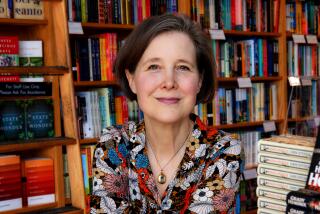FICTION
THE PATRON SAINT OF LIARS by Ann Patchett (Houghton Mifflin: $21.95; 336 pp.) Ann Patchett does two difficult things in this debut novel. First, she welds disparate worlds together so that the seam barely shows. There’s rootless, contemporary Southern California, complete with a compulsive driver who could be one of Joan Didion’s heroines. And there’s rural Kentucky, where roots go generations deep and where that same driver’s trip ends at St. Elizabeth’s, a Catholic home for pregnant girls presided over by a saintly nun who can tell the sex of unborn babies and whether they will live or die.
Second, Patchett achieves a maturity of outlook rare in a young writer, an ability to see beyond her own experience. This novel has three narrators: Rose, the driver and the primary “liar” of the title, who flees her loving husband because she doesn’t love him; Son, the middle-aged caretaker at the home, who marries Rose although she doesn’t love him either; and Cecilia, the child Rose doesn’t want to lose--she marries Son to avoid giving Cecilia up for adoption--yet later mothers in a strangely distant way. All are equally convincing.
In fact, those who doubt that writers can write about the opposite sex should check out some of Patchett’s big scenes. Read about the tough girl from a coal-mining town who secretly has her baby at St. Elizabeth’s, without crying out, so she can hold it during the ride to the hospital where it will be taken away from her. Fine. Then read about Son getting drunk on his first night’s leave from Marine boot camp during World War II, getting tattooed and getting shot in an accident that will change his life forever. Just as good.
If Patchett’s youth shows at all, it’s in her belief that passions can last a lifetime, or most of one. Part of this comes from her natural zest as a storyteller. And part of it may come simply from believing. This is, after all, a religious book--not just because it has nuns in it, or because characters wait for a “sign from God” to determine their lives, but because it searches for goodness as stubbornly as other novels search for evil. And finds it, even in unlikely places.
More to Read
Sign up for our Book Club newsletter
Get the latest news, events and more from the Los Angeles Times Book Club, and help us get L.A. reading and talking.
You may occasionally receive promotional content from the Los Angeles Times.






